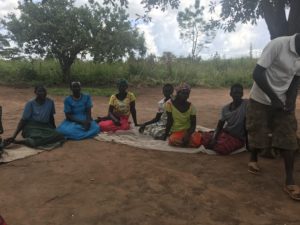“God gave burdens; he also gave shoulders.” Yiddish proverb
This is, appropriately enough, Mental Health Awareness Week, and people around the globe are working to come to terms with the unwelcome burden of stress on their shoulders, thanks to the COVID-19 pandemic. A little kindness from others has never been more important for our daily survival. It helps to know we are not alone. It is also important to be kind to ourselves under these unusual circumstances. This is not mystical nonsense – psychological studies show being kind to ourselves in a time of stress can boost our confidence and optimism.
Life in northern Uganda
As Angela reflects on her life in northern Uganda, these are not the “golden years” she expected when she was younger. At seventy, she is caring for a son with epilepsy and a daughter with severe depression, and her grand-children. Angela’s husband is now blind, so he is unable to help her. This means the family depends on her farming to support them.
Angela was just getting by until someone stole her cows. Now, she must plant her fields by hand, rather than with a plow/plough. The theft of these valuable animals – cows confer social status as well as being walking savings accounts – felt like an impossible burden. She was approaching burnout, a phenomenon familiar to anyone who has been a care giver.

Thankfully, last year Angela heard about the help offered by Network for Africa’s local partner, Basic Needs UK in Uganda (BNUU). She and her son and daughter received counseling and the appropriate medicine. She also joined a self-help group where she quickly rose to be the chairperson (the group’s meetings are suspended for the time being because of the COVID-19 pandemic).
“The self-help group has helped me survive,” she told us. The kindness she found there gave her a sense of belonging, knowing that other people were sympathetic and concerned about her.
“We all save together whatever we can each week, and I can borrow from it and then I am able to pay it back later. We also share different experiences in this group. This has shown me that I am not alone and that there are other people who are even worse than I am. This has given me the courage to move on.”
Angela feels less isolated, and gets strength from her new position in the community.
Four kinds of people
The final word goes to the former US first lady, Rosalyn Carter:
There are only four kinds of people in the world:
– Those who have been caregivers.
– Those who are currently caregivers.
– Those who will be caregivers,
– and those who will need a caregiver.
Our projects in Uganda, Rwanda and Sierra Leone offer training and support to people like Angela who are carrying a burden that many of us would find overwhelming.
During the pandemic we have switched our group therapy sessions to individual mobile phone calls. The need remains enormous, and we are adapting as best we can in challenging circumstances. Thank you.
Help Support Africa’s CareGivers